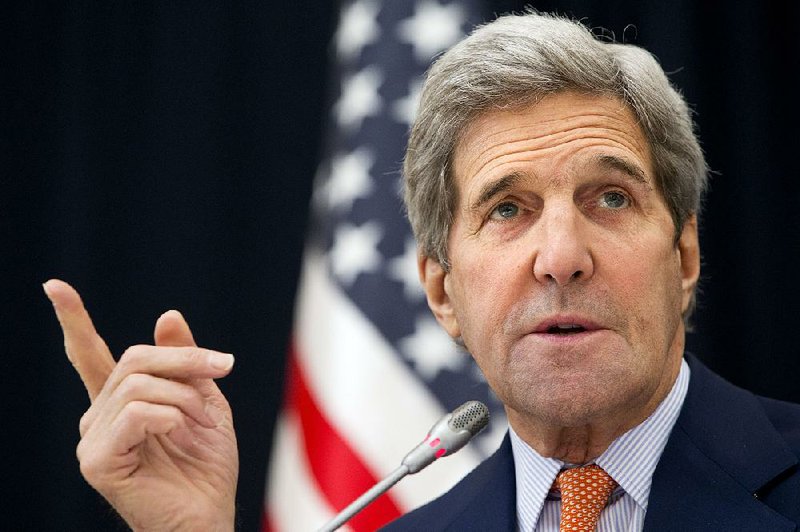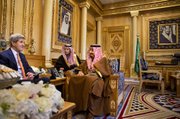RIYADH, Saudi Arabia -- U.S. Secretary of State John Kerry on Saturday attempted to ease uncertainty over Syrian peace talks and rising tensions between Saudi Arabia and Iran as he met with Gulf Arab officials in the Saudi capital.
After meeting with foreign ministers from the six nations in the Gulf Cooperation Council, Kerry said he was confident that initial talks between the Syrian government and opposition groups would take place as planned this week in Geneva. The warring participants won't be at the same table, or even in the same room, but they will be in the same venue while United Nations envoy Staffan de Mistura acts as a go-between.
If disputes or other problems arise during the talks, Kerry told reporters, a 20-member multinational group that has promoted peace talks will convene immediately after the Geneva meetings end.
"We want to keep the process moving and put to full test the readiness and willingness of people" to achieve peace, Kerry said, expressing concern that the violence in Syria could spill over its borders.
But diplomats warn that the U.N.-sponsored talks between the Syrian government and opposition, scheduled to begin Monday, could be delayed by disagreements over which parties are invited to participate.
De Mistura is expected to invite two separate opposition delegations to the negotiations in Geneva, according to three Western and U.N. diplomats, who asked not to be identified because the matter is still confidential. De Mistura is scheduled to provide details of the peace process at a briefing Monday in the Swiss city.
An opposition negotiating team announced in Saudi Arabia last week and endorsed by the U.S. includes Saudi-backed Islamic rebel factions, such as the Army of Islam, that are considered terrorists by the Syrian government and Russia. It excludes, among other groups, representatives of the Democratic Union Party, a Kurdish group that has been instrumental in the fight against the Islamic State in northern Syria.
Russia has objected to the inclusion of Army of Islam. It has demanded that Moscow-friendly figures join the negotiations, including Qadri Jamil, a former Syrian deputy prime minister, and Saleh Muslim, co-leader of the Democratic Union Party, Kommersant newspaper reported Saturday.
In a compromise, Russia won't block the inclusion of Army of Islam at the talks if a separate delegation is invited with the opposition figures that Russia has proposed, a Western diplomat in Moscow said.
Russian Foreign Ministry spokesman Maria Zakharova said she had no information about which opposition delegates will attend the talks in Geneva. A spokesman at the U.S. State Department declined to immediately comment.
Syrian opposition groups on Saturday denounced what they said were Russian "dictates" to the negotiating team and said it is "impossible" to begin negotiations without the implementation of U.N. resolutions pertaining to humanitarian issues.
A joint statement signed by 45 opposition and rebel groups said that while they support a political process, they hold the Syrian government and its Russian backers responsible for any failure in peace talks because of "ongoing crimes."
Opposition groups have accused Russia of obstructing the talks by trying to impose the conditions on which opposition groups can participate. The groups said they will not take part in talks while Syrians die from blockades and Russian and government airstrikes. Moscow is a key ally of the Syrian government and has been carrying out airstrikes against insurgents since Sept. 30.
The statement issued Saturday was signed by the Syrian National Coalition, the main Western-backed opposition group, as well as 44 rebel groups including Army of Islam.
It called for the implementation of U.N. Security Council resolutions that call on parties to immediately allow humanitarian agencies unhindered access throughout Syria, in particular in all besieged areas, and to cease attacks against civilians.
"We consider the fulfillment of these provisions a basic human right without which it is impossible to begin the negotiating process," the statement said. It added: "We fully and categorically reject Russian dictates ... [and] barefaced meddling in the affairs of the opposition delegation."
Kerry expressed belief that the sides can reach a deal on the negotiations' participants.
"We are quite confident that there is a way to invite the various interested stakeholders that provides for cohesion and the ability to make the process move forward," he said.
In his comments after the foreign ministers meeting, Kerry noted that there also are divisions over the future of Syrian President Bashar Assad. The United States insists that Assad must eventually leave power and elections be called within 18 months of peace talks starting.
With Assad in power, Kerry said, "We know that the war in Syria cannot end -- it's not that it will not end, it's not that people choose otherwise -- it's that it cannot end, because he is the magnet that attracts the violent terrorism and jihadis who will continue to come as long as he or his supporters insist he is a part in a long-term future.
"We are going to do everything in our power as nations that are deeply impacted by the consequences of Syria to try to push this process forward and help to act as constructive catalysts and try to help Syrians to bring about the peace that they desire so much," he said.
But Russia has made progress in weakening U.S. opposition to Assad standing for re-election, according to Russian and Western diplomats. The U.S., Russia and other nations have agreed on a timetable to form a transitional government in Syria within six months and hold elections within a year and a half.
While the U.S. still says Assad can't lead Syria over the long term, President Barack Obama's administration has backed away from insisting that he go at the start of a transition process.
Kerry and Russian Foreign Minister Sergey Lavrov have discussed respecting the right of Syrian people to define the future of their country.
More than 250,000 Syrians have been killed in a civil war that has displaced millions of people, spawned an Islamic caliphate run by militants, and drawn both foreign fighters and military intervention by countries including Russia, Iran and the U.S. Two previous attempts to negotiate an end to the conflict have failed.
Later Saturday, Kerry met with Saudi King Salman and the Saudi deputy crown prince. He also planned to see the chief negotiator for the Saudi-backed Syrian opposition.
Saudi-Iran conflict
Kerry also is trying to defuse tensions between Iran and Saudi Arabia and urge Riyadh to restore diplomatic relations with Tehran. After Saudi Arabia executed a Shiite cleric earlier this month and protesters stormed Saudi diplomatic compounds in Tehran and another city, Saudi Arabia cut ties. The regional rivals are involved in organizing the Syrian peace talks, and the rising hostilities have raised concerns that their dispute will spill over and affect the peace talks.
Talking to reporters after meeting with Kerry, Saudi Foreign Minister Adel al-Jubeir dismissed the idea that the United States and Iran will improve their relations after a nuclear deal was implemented this month.
"No, I don't see a coming together of the United States and Iran," he said. "Iran remains the world's chief sponsor of terrorism."
Iran's supreme leader, Ayatollah Ali Khamenei, has expressed regrets over the attack on the Saudi Embassy, but al-Jubeir on Friday called the apology "meaningless" unless Iran changes its policies and stops supporting terror.
Al-Jubeir on Saturday denounced Iran for its "hostile and aggressive stance" against Arab nations. But he said he did not believe that Washington would act rashly in dealing with Tehran because of the nuclear deal just put in place. It has given Tehran access to billions in formerly frozen assets.
He took a swipe at Iran by noting that in the swap that resulted in the release of four imprisoned Americans in Iran, none of the seven Iranians cleared of charges in the United States opted to return to Iran.
It "tells you what a great country Iran is that no one wanted to return to it," he said. Six of the seven are dual nationals.
Kerry avoided such criticism of Iran but stressed that the U.S. shares concerns about Iran's behavior and will act against it when necessary, including imposing new sanctions as it did last week in response to Iranian ballistic missile tests.
Al-Jubeir said he was confident that the United States shared Saudi Arabia's view of Iran.
"Overall, I think the United States is very aware of the danger of Iran's mischief and nefarious activities," he said. "I don't believe the United States is under any illusion as to what type of government Iran is."
Kerry said the United States has assured the six countries in the Gulf Cooperation Council that "the United States, as we have said many times, will stand with them against any external threat and defend, if necessary, together with them against those threats."
Information for this article was contributed by Carol Morello of The Washington Post; by Matthew Lee and staff members of The Associated Press; and by Deema Almashabi, Henry Meyer and Kambiz Foroohar of Bloomberg News.
A Section on 01/24/2016

